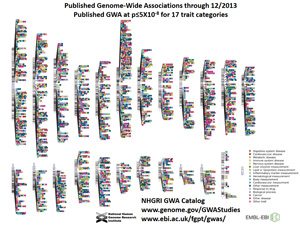GWAS (Genome Wide Association Study)


GWAS is the acronym of “Genome Wide Association Study”, that is, a comprehensive study on genome associations, in relation to the risk of disease or metabolic dysfunction.According to theNational Cancer Institute (USA), a GWAS is:”A study that compares DNA markers across the genome (the complete genetic material in a person) in people with a disease or trait to people without the disease or trait. These studies may uncover clues to help prevent, diagnose, and treat disease. Also called genome-wide association study.”In practice, it consists of selecting between 2,000 – 4,000 patients with a specific metabolic disease or dysfunction and many other controls, and to determine in all them, not the complete genome, only a previously selected between 250,000 and 500,000 SNPs, in order to see which ones appear more or less in a group in relation to the other, with a statistically significant value.Once the SNPs are selected (which are very variable but usually oscillates between 10 and 50 SNPs), the study is repeated in a biger population. Finally, when a consensus is reached, a risk factor for each SNP must be assigned (OR).
Dr. Juan Sabater-Tobella
European Specialist in Clinical Chemistry and Laboratory Medicine (EC4)Member of the Pharmacogenomics Research NetworkMember of the International Society of Pharmacogenomics and Outcomes ResearchPresidente de EUGENOMIC®
Last modified: Nov 20, 2018 @ 5:26 pm